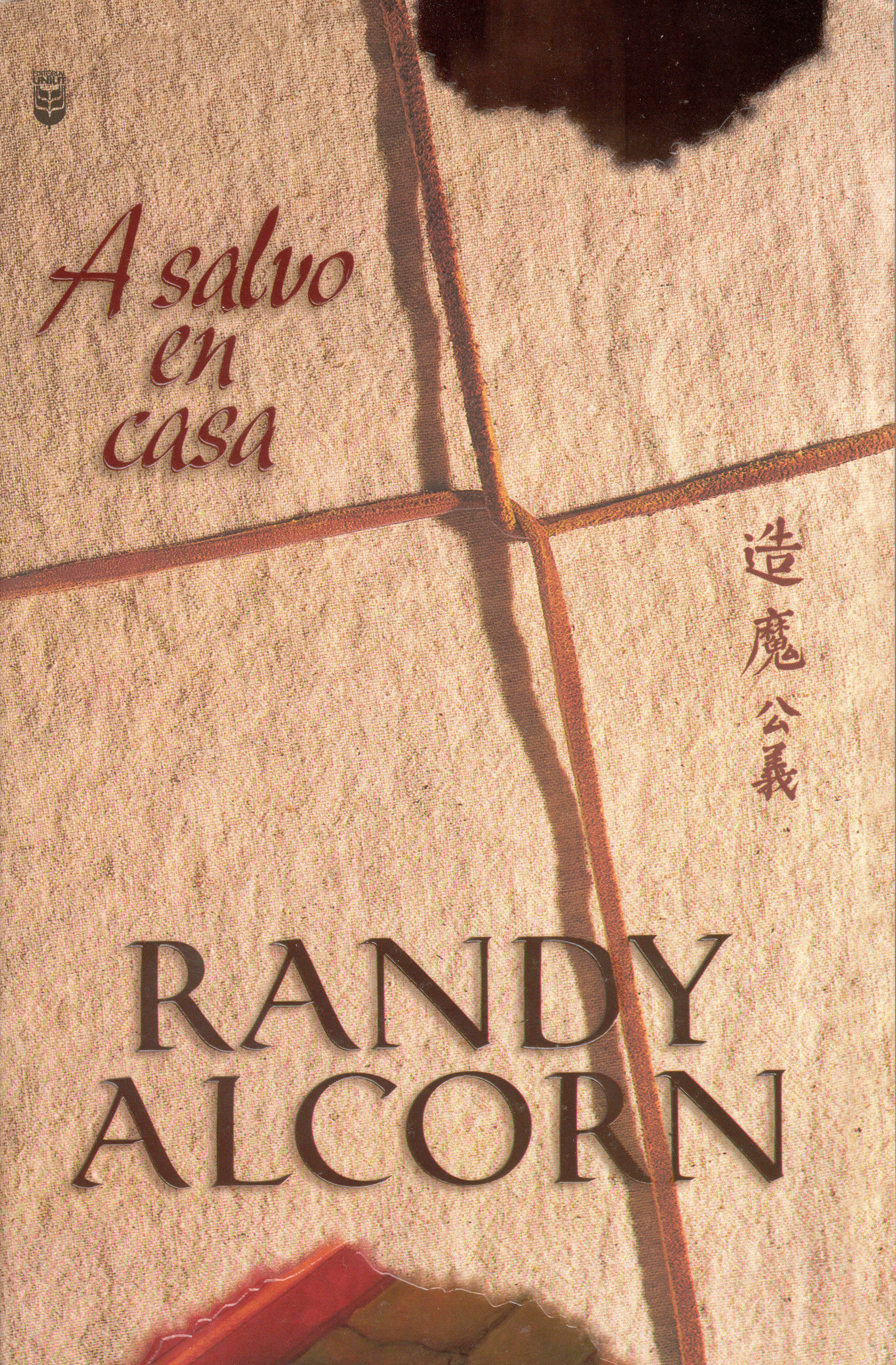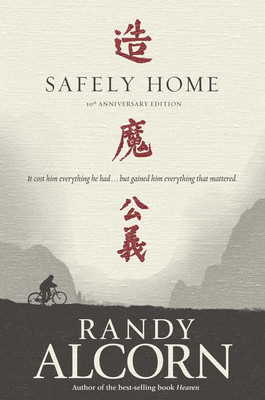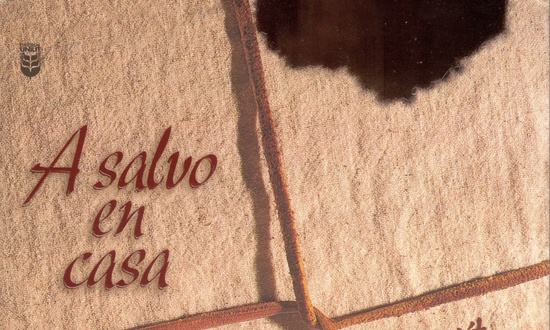Ben, Ming y Shen estaban todos sentados en el suelo, escribiendo con plumas en el mismo pedazo de tela color canela. Ben miraba a la Biblia, escribía unas palabras, después seguía viéndolas de nuevo para asegurarse de que lo había hecho bien. Shen copiaba palabras también. Ming escribía rápido pero con cuidado, pero pocas veces tenía que mirar a Shengjing para saber qué escribir después.
 El veintidós de enero, Ben llegó a la prisión con una bolsa en la mano. El guardia externo se acercó a él, con símbolos de dólares en sus ojos.
El veintidós de enero, Ben llegó a la prisión con una bolsa en la mano. El guardia externo se acercó a él, con símbolos de dólares en sus ojos.
Ben le dio la bolsa. El guardia extrajo una camiseta Prince color canela con la imagen de una raqueta de tenis azul y una pelota amarilla. Él abrió el cuello para examinar las etiquetas. Ben tragó en seco. El hombre señaló las etiquetas.
—¿Extra grande? Prisionero no es extra grande.
—A él le gustan las camisas holgadas—dijo Ben.
—Usted tendría que hacerlo que valga la pena para que yo haga esto.
—¿Treinta dólares?
—Antes, usted me dio cien dólares americanos para llevarle ropa a él.
—Bien —Ben abrió su cartera y le dio cinco billetes de veinte dólares, junto con la camiseta—. Pero dele estas dos botellas de agua, por favor. Y vea que tengamos un poco más de tiempo para hablar, ¿está bien? —el guardia asintió con la cabeza. Ben caminó hacia su lugar de visita en la cerca, culpándose de ser tan mal negociante por haber ofrecido cien dólares la última vez.
Después de cinco minutos, Quan salió.
—Gracias por la camisa —dijo él—. La voy a disfrutar muchísimo —miró a Ben—. ¿Estás pagando soborno para visi- tarme?
Ben encogió sus hombros.
—No importa cuántas llamadas telefónicas y cuántas visitas hago, no te puedo sacar.
—Debes orar y ser paciente y no tratar de hacer tanto que te opones a los propósitos secretos de Dios.
—¿Sí? Bueno, si yo pudiera hacerlo, asaltaría este lugar con un montón de cámaras de televisión occidentales para exponer toda esta corrupción.
—Yo pronostico muchas cámaras rotas y huesos rotos y ninguna película saliendo de China. Antiguo proverbio: “Debes cruzar el río antes de decirle al cocodrilo que tiene mal aliento”.
—Sí, bueno yo conozco otro proverbio chino: “Hombre que espera que pato asado vuele a su boca debe esperar un largo tiempo”.
Quan se rió.
—Ben Fielding tiene razón. Algunas veces no debemos solo esperar, sino ¡tomar acción! Pero ahora antes que me lleven de regreso, debo pedirte que le lleves un mensaje a Zhou Jin. Él sabrá cómo hacérselo llegar a las personas al otro lado de las montañas. Es un mensaje para un pastor llamado Fu Chi de su hijo Fu Liko. Un segundo mensaje es para la joven esposa de Fu Liku y su pequeña hija. Es muy importante que les hagas llegar estos mensajes.
—Trataré—Ben sacó su libreta y pluma del bolsillo interior de su chaqueta.
—Escríbelos con cuidado. El mensaje para Fu Chi es: “Te veré de nuevo, pronto”.
—¿Él está saliendo? ¿Por qué no puede ir a su hogar y darles el mensaje él mismo?
—Él ya está en su hogar.
—No te comprendo, Quan.
—Fu Liko murió hace dos noches. Un momento antes, me permitieron entrar en su celda para limpiarla. Él sabía que estaba al morir. Él dijo que les dijera a su esposa y su hija tres cosas. Su hija es solo una niña, así que su esposa le debe enseñar estas cosas a medida que crezca. Las he repetido para que no se me olvidaran. Escribe, Ben Fielding.
—Estoy listo.
—Estos son los tres mensajes de Fu Liko: Nunca te olvides que Yesu es Rey. Nunca te olvides que tu hogar está en otro mundo. Nunca te olvides que tu padre estará esperando para verte de nuevo.
—Haré todo lo posible para hacerles llegar el mensaje.
—Escribe estas palabras en tu corazón, Ben Fielding, no solo en papel. Porque no son solo para la familia de Fu Liko. Son también para mí y para ti.
Extracto de A Salvo En Casa (fuera de la impression) por Randy Alcorn, Capítulo Cuarenta y Cuatro.
Safely Home, Chapter 46
Ben, Ming, and Shen all sat on the floor, writing with pens on the same piece of tan cloth. Ben looked at the Bible, wrote a few words, then kept looking back to be sure he had it right. Shen copied words also. Ben noticed Ming wrote swiftly yet carefully, but rarely had to look at Shengjing to know what she would write next.
On January 22, Ben came to the prison gate with a bag in his hand. The outer-perimeter guard approached him, dollar signs in his eyes.
Ben handed him the bag. The guard took out a tan Prince T-shirt with the image of a blue tennis racquet and yellow ball. He opened the neck to examine the tags. Ben swallowed hard. The man pointed to the tag.
“Extra large? Prisoner is not extra large.”
“He likes his shirts big,” Ben said.
“You would have to make it worthwhile for me to do this.”
“Thirty dollars?”
“Before, you gave me one hundred American dollars to bring in clothes for him.”
“Alright. I’ll go fifty.”
“One hundred,” the guard said, handing the bag to Ben.
“Okay.” Ben opened his wallet and gave himfive twenty-dollar bills, along with the T-shirt. “But get him these two water bottles, will you? And see to it that we get a little more time to talk, okay?” The guard nodded. Ben walked to his visiting place at the fence, kicking himself for being a poor businessman by offering the hundred dollars last time.
After five minutes, Quan came out, looking closely at Ben. “My friend does not appear to have been sleeping well. As a polite American might say, you look like crud.”
Ben laughed.
“Thank you for the shirt,” Quan said. “I will enjoy it very much.” He looked at Ben. “Are you paying bribes to visit me?”
Ben shrugged. “No matter how many phone calls and visits I make, I can’t get you out.”
“You must pray and be patient and not try to do so much that you oppose the hidden purposes of God.”
“Yeah? Well, if I could pull it off, I’d storm this place with a bunch of Western TV cameras and expose all this corruption.”
“I predict many broken cameras and broken bones, and no film leavingChina. Old saying: You must cross the river before you tell the crocodile he has bad breath. ”
“Yeah, well I know another Chinese proverb: Man who waits for roast duck to fly into mouth must wait very long time.”
Quan laughed weakly. “Ben Fielding is right. Sometimes we must not just wait, but take action!”
“There are many wise sayings among my people.”
“Yes, Li Tong. And who do you think gave them these insights?” “You. Who else?”
The Carpenter smiled.
“One moment after men die,” Li Tong said, “they know exactly how they should have lived. But then it is too late to go back and live their lives over again. Too late for the unbeliever, in the jaws of hell. But also too late for the believer, who cannot relive his life, remake his choices, this time following his King more faithfully.”
“But I gave you my Word so that you did not have to wait until you died to know how you should have lived.” He put his hand in the middle of Tong’s back as they walked through a beautiful grove of carefully sculpted ginkgo trees, their fan-shaped leaves a rich green, swaying in a gentle breeze.
“You served me faithfully, Li Tong. Not perfectly. But faithfully. Your reward shall be great.”
“My father taught me, ‘Never postpone obedience to Yesu.’ ”
“This father of yours was wise,” said someone approaching them from behind.
“Perhaps because his father taught him well,” came another voice.
“Li Manchu and Li Wen,” the King said, laughing. “Welcome, my friends.” He put his hands on their heads and mussed their hair. “Soon there will be so many of the Li clan that I will have to add on rooms for them.” All four of them laughed and embraced.
When the laughter subsided, Li Tong looked into the King’s eyes and interceded for his son Li Quan, whom he could see through the portal talking with Ben Fielding outside his cell. Li Wen and Li Manchu spoke on his behalf as well. Then the King himself raised his head and prayed, calling upon his Father to work in the life of his sons Li Quan and Ben Fielding.
“Before they take me back, I must ask you to get a message to Li Yue or Zhou Jin. They will know how to get it to the people across the mountains. It is a message for a pastor named Fu Chi.”
“Fu Chi? The one with the long scar?”
“How did you know?”
“He was at the seminary in the cave. He said his son was in jail. He was looking for him. Is he here?”
“The first message from Fu Liko is for his father, Fu Chi. The second message is for Fu Liko’s young bride and baby daughter. It is very important that you get these messages to them.”
“I’ll try.” Ben took his notepad and pen from his inside jacket pocket. “Write them carefully. The message for Fu Chi is ‘I will see you again soon.’ ”
“He’s getting out?”
“He is already out.”
“I don’t under stand. If he’s out, why can’t he go home and give them the message himself?”
“He is already home.”
“You’ve lost me, Quan.”
“Fu Liko died two nights ago. Just before this, I was allowed into his cell to clean it. He knew he was about to die. He said to tell his wife and daughter three things. His daughter is just a child, so his wife must teach her these things as she gets older. I have repeated them so I would not forget. Write, Ben Fielding.”
“I’m ready.”
“These are the three messages of Fu Liko: Never forget Yesu is King. Never forget your home is in another world. Never forget your father will be waiting to see you again.”
“I’ll do every thing I can to get the message to them.”
“Write these words on your heart, Ben Fielding, not just on paper. For they are not only for the family of Fu Liko—they are also for me and for you.
Excerpt from Safely Home, by Randy Alcorn, Chapter 46.


